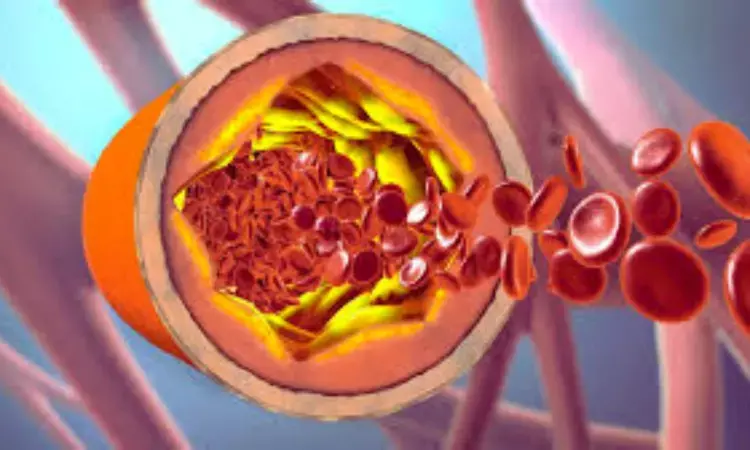- Home
- Medical news & Guidelines
- Anesthesiology
- Cardiology and CTVS
- Critical Care
- Dentistry
- Dermatology
- Diabetes and Endocrinology
- ENT
- Gastroenterology
- Medicine
- Nephrology
- Neurology
- Obstretics-Gynaecology
- Oncology
- Ophthalmology
- Orthopaedics
- Pediatrics-Neonatology
- Psychiatry
- Pulmonology
- Radiology
- Surgery
- Urology
- Laboratory Medicine
- Diet
- Nursing
- Paramedical
- Physiotherapy
- Health news
- Fact Check
- Bone Health Fact Check
- Brain Health Fact Check
- Cancer Related Fact Check
- Child Care Fact Check
- Dental and oral health fact check
- Diabetes and metabolic health fact check
- Diet and Nutrition Fact Check
- Eye and ENT Care Fact Check
- Fitness fact check
- Gut health fact check
- Heart health fact check
- Kidney health fact check
- Medical education fact check
- Men's health fact check
- Respiratory fact check
- Skin and hair care fact check
- Vaccine and Immunization fact check
- Women's health fact check
- AYUSH
- State News
- Andaman and Nicobar Islands
- Andhra Pradesh
- Arunachal Pradesh
- Assam
- Bihar
- Chandigarh
- Chattisgarh
- Dadra and Nagar Haveli
- Daman and Diu
- Delhi
- Goa
- Gujarat
- Haryana
- Himachal Pradesh
- Jammu & Kashmir
- Jharkhand
- Karnataka
- Kerala
- Ladakh
- Lakshadweep
- Madhya Pradesh
- Maharashtra
- Manipur
- Meghalaya
- Mizoram
- Nagaland
- Odisha
- Puducherry
- Punjab
- Rajasthan
- Sikkim
- Tamil Nadu
- Telangana
- Tripura
- Uttar Pradesh
- Uttrakhand
- West Bengal
- Medical Education
- Industry
Intracranial Occlusion Not Linked to Higher Stroke Recurrence, suggests study

Researchers have demonstrated in a new study that intracranial occlusion in embolic stroke of undetermined source (ESUS) patients is not a risk factor for recurrent ischemic stroke. The research also indicated that anticoagulation did not reduce recurrence in those with or without intracranial occlusion. These results emphasize that intracranial occlusion in ESUS does not independently warrant anticoagulation treatment. The study was published in the Journal of the American Heart Association by Matthew M. and colleagues.
This multicenter retrospective cohort comprised 2,328 adults with cryptogenic stroke and was followed for a median of 1.31 years (interquartile range: 0.34–2.85). Of these, 999 patients (42.6%) presented with a proximal or medium/distal intracranial occlusion. Recurrent ischemic stroke was the main outcome and was measured using unadjusted and adjusted Cox proportional hazards models. For added robustness, the analyses were repeated following 1:1 propensity score matching and biweight kernel density matching.
Results
Intracranial occlusion patients had fewer atherosclerotic vascular risk factors, more severe stroke symptoms, and less severe cerebral microvascular disease than patients without intracranial occlusion. In spite of these differences, recurrence rates were nearly the same for the two groups:
• 6.8% per year (95% CI: 5.7–8.2) in intracranial occlusion patients
• 7.0% per year (95% CI: 6.0–8.1) in patients without intracranial occlusion
• The adjusted hazard ratio (HR) for recurrent stroke was 1.09 (95% CI: 0.77–1.55), which showed no significant difference.
• In propensity score matching, HR was 1.01 (95% CI: 0.64–1.59), and in kernel density models, HR was 0.95 (95% CI: 0.62–1.45).
Notably, intracranial occlusion did not alter treatment with anticoagulation, sex, age, or high‐risk sources of embolism.
These results indicate that intracranial occlusion in ESUS is not a predictor of increased stroke recurrence risk and anticoagulation provides no added value by occlusion status. This refutes the hypothesis that intracranial occlusions are similar to cardiac embolic sources regarding recurrence risk and warrants more directed therapeutic approaches.
The study concluded that intracranial occlusion in patients with embolic stroke of undetermined source was not associated with higher recurrence of ischemic stroke. Moreover, the use of anticoagulation did not influence recurrence rates regardless of occlusion status.
Reference:
Dr Riya Dave has completed dentistry from Gujarat University in 2022. She is a dentist and accomplished medical and scientific writer known for her commitment to bridging the gap between clinical expertise and accessible healthcare information. She has been actively involved in writing blogs related to health and wellness.
Dr Kamal Kant Kohli-MBBS, DTCD- a chest specialist with more than 30 years of practice and a flair for writing clinical articles, Dr Kamal Kant Kohli joined Medical Dialogues as a Chief Editor of Medical News. Besides writing articles, as an editor, he proofreads and verifies all the medical content published on Medical Dialogues including those coming from journals, studies,medical conferences,guidelines etc. Email: drkohli@medicaldialogues.in. Contact no. 011-43720751


